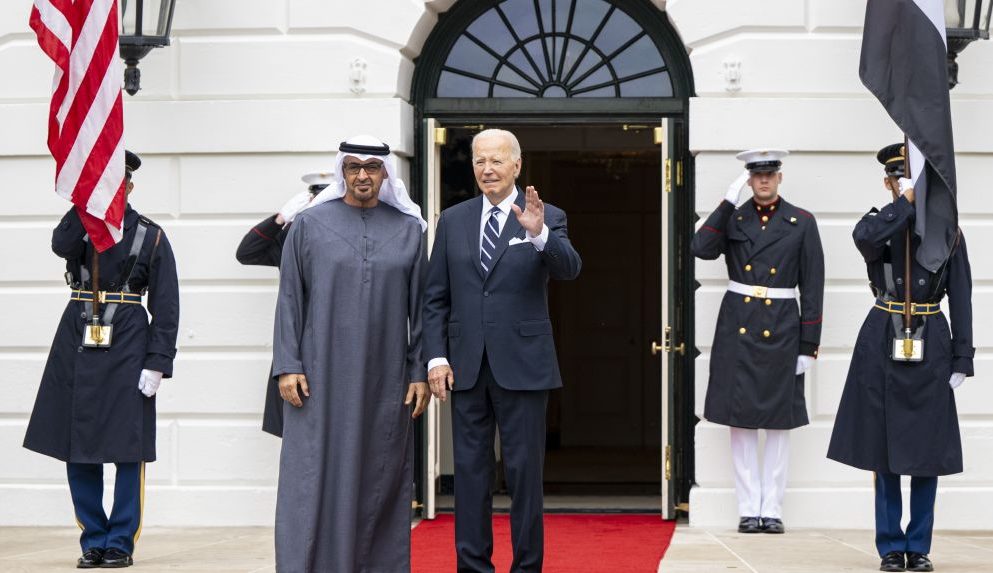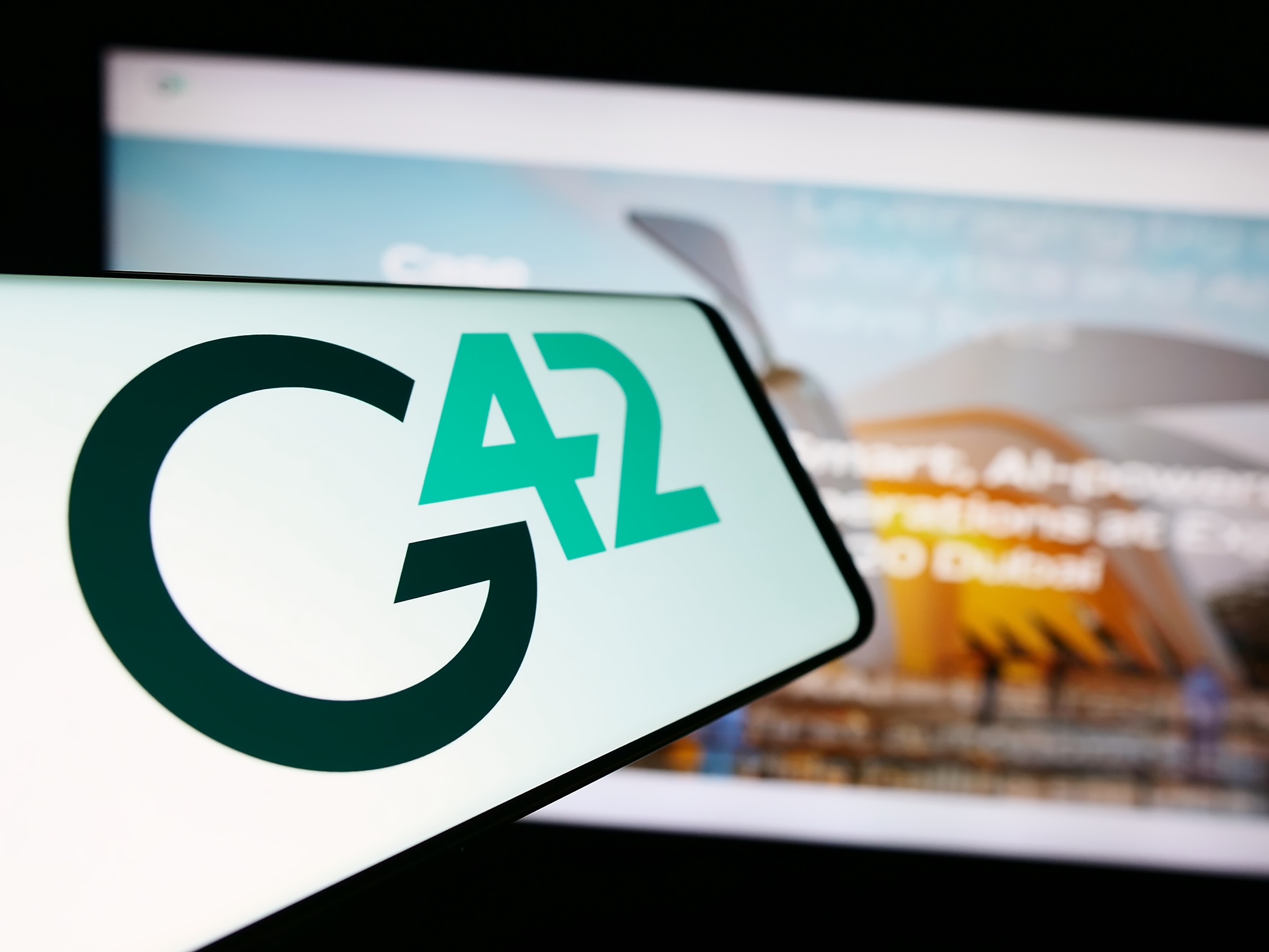Publications
INSS Insight No. 1909, November 7, 2024
The visit to the United States by the president of the United Arab Emirates (UAE), Sheikh Mohamed bin Zayed, in September 2024, along with his meeting with US President Joe Biden, was meant to signal a new beginning in relations between the two countries. These relations have been marked by tensions, mainly due to the development of closer ties between Abu Dhabi and Beijing, including cooperation in artificial intelligence through G42, a UAE company. If the understandings reached at the end of the visit regarding AI, among other topics, materialize, they are likely to pave the way for a new era in US–UAE relations and could also positively impact relations between Israel and the UAE.
On September 23, 2024, the president of the UAE, Sheikh Mohamed bin Zayed, arrived at the White House for a meeting with US President Joe Biden, Vice President Kamala Harris, and other senior American officials. This marked the first visit to the United States by a ruler of the UAE since its founding in 1971. Bin Zayed’s last visit to the United States occurred in 2017, when he was crown prince.
Dominating the headlines surrounding the visit was the American designation of the UAE as a “major defense partner,” a title previously bestowed only on India. This designation established an official basis for extending security and defense ties between the two countries. The UAE is likely seeking a more binding defense agreement with the US, similar to the one currently being discussed between Washington and Riyadh. However, such an agreement requires congressional approval, which remains unfriendly toward the UAE.
This visit represented an effort to end a period of strained relations between the US and the UAE. Under the Biden administration, the main point of contention between Washington and Abu Dhabi has been the warming of relations between the UAE and China. The extent and quality of cooperation between these two countries in security, banking, energy, trade, and diplomacy have grown substantially over the past decade, with the UAE becoming China’s leading trade partner in the Middle East. Furthermore, reports of Chinese security activity in the UAE have been regularly leaked to the American press over the past four years. The tensions caused by this issue led the United States to suspend the negotiations for the UAE’s purchase of advanced F-35 aircraft, as part of the normalization agreement between the UAE and Israel.
In the past year, the UAE found itself at the center of another source of tension between the two superpowers, stemming from its cooperation with the technology company G42. Founded in 2018 in the UAE, G42 is the largest company of its kind in the Middle East and is headed by Sheikh Tahnoun bin Zayed, the highly influential national security adviser and brother of the UAE’s president. The company’s fields—AI, big data, cyberspace, and other advanced technologies—epitomize the UAE’s ambition to become a leader in AI and explain both the Chinese and American interest in the country.

In January 2024, the US House of Representatives Select Committee on Strategic Competition between the United States and the Chinese Communist Party began investigating G42’s suspected ties with large Chinese companies subject to American sanctions. The company is suspected of serving as a conduit for transferring advanced American technology and information about millions of Americans to Chinese companies or the Chinese government. Some of the Chinese companies with which G42 conducts business include telecommunications giant Huawei, biotechnology firm BGI, pharmaceutical company Sinopharm, technology company Tencent, and ByteDance, owner of TikTok.
G42’s cooperation with China has strained the UAE’s traditionally strong defense partnership with the US. Significant American forces have been stationed in the UAE, a loyal partner in managing conflicts ranging from Afghanistan to Bosnia and Somalia. Moreover, the UAE was a key initiator of the Abraham Accords and plays a vital role in the India-Middle East-Europe Economic Corridor (IMEC) and the American-sponsored regional anti-missile defense system, in which Israel participates.
In response to US concerns, G42 took decisive action. In December 2023, the company severed its ties with Huawei. Similarly, in February 2024, it sold all its shares in ByteDance, along with shares in other Chinese companies. This sale was likely motivated by G42’s desire to advance its collaboration with the American company Microsoft in cloud computing and advanced AI solutions, which was agreed upon in April 2023. In April 2024, after G42 appeared to have cut off connections with several Chinese companies, Microsoft announced it was investing $1.5 billion in G42. It seemed that the cooperation between G42 and Microsoft was making substantial progress. However, these measures did not entirely alleviate the concerns of officials in Washington, who remain skeptical about G42’s ability to fully sever its ties with Chinese companies. For example, G42 still maintains connections with Chinese companies BGI, Sinopharm, and Tencent.
Possible leaks of sensitive technology from the UAE to China should also concern Israel, following a series of cooperation agreements signed between Israeli companies and G42. For instance, in July 2020, Rafael Advanced Defense Systems entered into an agreement with a UAE company to collaborate on research and development aimed at combating COVID-19. A month later, G42 announced it was partnering with NanoScent, an Israeli startup specializing in scent recognition, to develop, verify, distribute, and produce Scent Check—a groundbreaking solution capable of detecting suspected COVID-19 cases from a breath sample. In November 2022, the Sheba Medical Center at Tel Hashomer announced its collaboration with G42 on stem cell research and medical innovation across various health fields. However, of all these agreements, the only partnership that has continued is between the UAE-based company and venture capital fund Viola Ventures, which is tasked with locating and recruiting engineers and scientists to work in Abu Dhabi.
G42’s challenges are not limited to business matters. The UAE’s financial resources and connections to the Global South present significant opportunities for both China and the United States, which are competing for leadership in the AI sector. China is actively strengthening its ties with countries in the Global South and positioning itself as their leader. Many of these nations have adopted Chinese standards for their digital communications, complicating the entry of American alternatives. Conversely, the United States boasts advantages in advanced technologies, such as cloud computing and large language models, which leverage AI capabilities. Washington has a vested interest in promoting its advanced technologies over competing options, like those from Huawei, but it must ensure that these technologies do not fall into the hands of its superpower rival.
As for the UAE, it is noticeably disappointed with the American role in the Middle East, particularly concerning its policy on Iran. The UAE feels that the United States has not shown sufficient willingness to protect Emirati interests when they are threatened. This sentiment was especially evident in early 2022, when the UAE was attacked by the Houthis, Iran’s proxies in Yemen. The lack of American response to that attack was viewed as a pivotal moment for the UAE, leading it to become more inclined—as had already been apparent in 2019—to improve relations with Iran, which continues to be perceived as the primary threat.
For its part, the United States has also been dissatisfied with the “independent” policy adopted by the UAE on a series of issues, particularly the UAE’s military intervention in Sudan and its attitude toward several countries, particularly Russia and China. The UAE is trying to realign its relations with the United States to focus on an economic and technological partnership, alongside security elements. The term “geotechnology” has become an Emirati buzzword, replacing “geostrategy” to reflect the UAE’s emphasis on innovation.
“Mr. President, I want you to know that I remain committed to the UAE’s security,” President Biden said at the conclusion of his speech welcoming the UAE’s president, Sheikh Mohamed bin Zayed. In addition to underscoring the American security commitment to the UAE, one immediate outcome of the Biden-bin Zayed meeting was agreement on the wording of a memorandum of understanding regarding cooperation in AI, which will likely impact the G42 affair. The challenge for the United States is how to persuade the UAE to choose a side and cease its attempts at neutrality. This, however, contradicts the UAE’s security doctrine of “strategic hedging.” Ultimately, achieving this objective will probably require a clearer security commitment from the Americans to its ally.
Israel has a substantial interest in closer relations between the United States and the UAE. G42 is currently the center of a dispute between the two countries concerning AI. Although Israel’s collaborative ventures with the company are very limited and largely theoretical at this stage, it is crucial for Israel to remain aware of this sensitive issue and to be prepared to provide explanations if necessary. In the future, Israel should establish a mechanism for evaluating every cooperative venture between Israeli companies and the UAE or other countries that engage with China. The leaking of technology via a third party could jeopardize Israel both directly and indirectly. Now, while Israel’s relations with some of Arab Gulf states are still being formed, is the right time to ensure that cooperative technology ventures do not expose Israel to risks.



